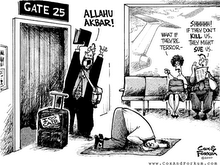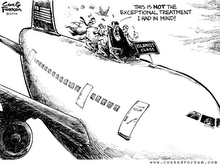When media speculated that the VA tech gunman was Muslim, many Muslim Americans cringed, but were relieved when he was not. Since 9/11, racial profiling and hate crimes against Muslims in the U.S. have risen significantly. The lack of understanding and tolerance of Islam among Americans has fueled Muslim outrage worldwide. How can we start down the long road to peace and understanding and heal the wounds of the past?
A March 2006 poll by the Washington Post and ABC News found that one in four Americans "admitted to harboring prejudice toward Muslims." The Post-ABC poll also showed that the number of Americans who believe that Islam promotes violence has more than doubled since 2002. An independent survey by the Council on American-Islamic Relations found that one-fourth of Americans consistently believe stereotypes such as: "Muslims value life less than other people" and "The Muslim religion teaches violence and hatred." Would Don Imus have been fired if his offensive remarks had been about Muslims?
How do American attitudes towards Islam affect Muslim Americans? 46 states do not have protections against religious profiling. Although some argue that racial profiling is a necessary tool for weeding out terrorists in the U.S., it is an infringement on the Constitutional rights of U.S. citizens:
- Six Imams (Muslim spiritual leaders) were pulled off their flight back to their homes in Phoenix and California last November, when a passenger passed a note to the attendant asking that they be removed from the plane. Three were praying in the lobby before boarding the plane.
- Tom Kubbany, a US citizen and resident of California, was denied a home loan when his middle name "Hassan" matched the name of a suspected terrorist (he was referenced as the “Son of Saddam”) on the "Specially Designated Nationals and Blocked Persons" watch list.
Muslims worldwide have seen the photos from Abu Ghraib in which U.S. soldiers tortured prisoners by forcing them to commit acts that are forbidden in Islam, such as a woman seeing a man naked or men naked in front of each other. These were perceived as an attack against Islam and an insult to their faith, a kind of religious torture. Can Muslims worldwide forgive us?
Many groups are working to teach Americans about Islam. Other groups are working to show that Islam is a peaceful religion, a mainstream religious faith. There are extremists in all faiths, including Christianity, but those extremists do not define the majority of the believers. Polls conducted by World Public Opinion show that Muslims have a negative view of the U.S., but still feel that our cultures can find common ground.
How have the U.S.’s actions in Iraq affected Muslims worldwide? How can we achieve a better cultural understanding amongst all faiths? How is the U.S. viewed by Muslims worldwide? How has targeting Muslims, regardless of their country of origin, damaged the image of the United States among the world community?
Thursday, April 26, 2007
pay attention to me, pay attention to me, pay attention to me
From the "Mainstream Media Project," whatever that is
Subscribe to:
Post Comments (Atom)









No comments:
Post a Comment